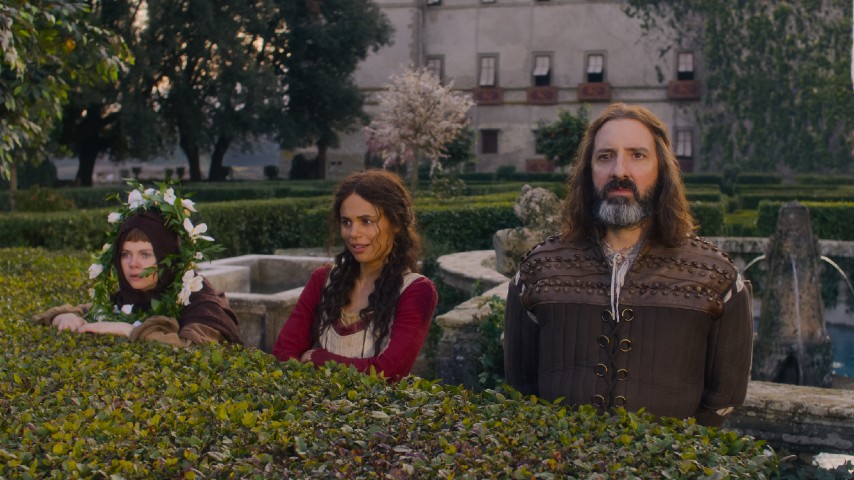The Decameron puts a dishy, hilarious twist on classical lit
A stellar cast makes this 14th-century-set Netflix series sing
Saoirse-Monica Jackson as Misia, Jessica Plummer as Filomena, and Tony Hale as Sirisco The Decameron (Photo: Netflix)
It’s safe to say we all remember 2020, when those of us who were able to lock ourselves in our homes, armed with surgical masks and Clorox wipes, to wait out the ravages of COVID-19. On couches everywhere, the world wondered: Was it better to hole up alone with only houseplants for company, or to share a space with roommates and/or loved ones who would keep you company but also drive you crazy? That all-too-familiar experience is the metatextual backdrop of Netflix’s The Decameron (out July 25), which follows a motley assemblage of 14th-century nobles and servants sheltering from the Black Death at a massive villa in the Florentine countryside.
Unless you studied classical lit in college, you’ve probably never read Giovanni Boccaccio’s short-story collection. But don’t be intimidated: Kathleen Jordan’s TV adaptation, which is very loosely based on its source material, is anything but stuffy and unapproachable. It’s a dishy, hilarious blast that’s by turns satirical, tender, savage, and existentially profound. Imagine mashing up the anachronistic comedy of Dickinson, the medieval brutality of Game Of Thrones, the horniness of Bridgerton, the upstairs-downstairs drama of Downton Abbey, the slapstick socialism of Monty Python And The Holy Grail, and the sadistic class warfare of Triangle of Sadness, and you’ll have a rough idea of what you’re in for.
An ensemble piece in the truest sense of the word, The Decameron is a dream for fans of character actors. The biggest names are Zosia Mamet and Tony Hale, but the show also boasts faves from beloved British and Irish series: Derry Girls’ Saoirse-Monica Jackson, Sex Education’s Tanya Reynolds, I Hate Suzie’s Leila Farzad, The Third Day’s Amar Chadha-Patel, EastEnders’ Jessica Plummer, I May Destroy You’s Karan Gill, and Slow Horses’ Dustin Demri-Burns.
If there is a protagonist, it’s Licisca (Reynolds), the maidservant of a spoiled noblewoman named Filomena (Plummer). As the two flee plague-ridden Firenze, Licisca pushes her mistress off a bridge and assumes her identity. (That isn’t the end for Filomena, though.) Their host at the Villa Santa is the even more spoiled Pampinea (Mamet), who’s come to meet her future husband, Leonardo, and claim her place as mistress of the estate—her loyal servant, Misia (Jackson), in tow. But she gets a nasty surprise when the villa’s longtime steward, Sirisco (Hale), informs her that her fiancé died of the pestilence before she arrived. Undeterred, the trio hatches a plan to conceal Leonardo’s death from the other guests.
Rounding out the motley crew are Tindaro (Douggie McMeekin), an entitled manchild, who, were he alive today, would definitely be a Reddit incel; his doctor, Dioneo (Chadha-Patel), gifted with rippling pecs straight out of a Harlequin romance; the charming, calculating Panfilo (Gill) and his pious wife, Neifile (Lou Gala); and Stratilia (Farzad), the villa’s no-nonsense cook—and the only rational person in the place.
We won’t spoil any of the ensuing chaos here. There’s no pleasure like gasping at the soap-operatic reveal of a secret relative, unlikely romance, or stunning betrayal—and The Decameron is stuffed full of them. We will tell you to expect plenty of power shifts, farcical misunderstandings, and sex. Seriously, there’s so much sex.
 Keep scrolling for more great stories.
Keep scrolling for more great stories.
